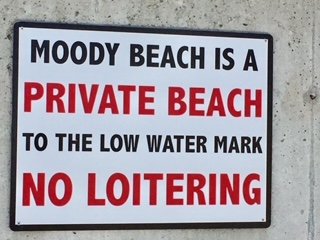How did this happen?
The Bell Cases
In 1984 a Moody Beach homeowner named Edward Bell brought a suit against the Town of Wells for regarding trespass laws on the beach abutting his house. The suit won in the lower court in 1986 and was upheld by the Maine Supreme Court in 1989 in a 4-3 vote. The decision concluded that shoreline access in Maine is based on a 1647 Massachusetts Colonial Ordinance, which states that ownership of shorefront property may extend to the low water mark and which limits public use to “fishing, fowling, and navigation.” The court also denied the public a prescriptive easement to recreate on Moody Beach, and determined the limits of “fishing, fowling, and navigation” should be taken literally.
Bell v Town of Wells I (1986): http://law.justia.com/cases/maine/supreme-court/1986/510-a-2d-509-0.html
Bell v Town of Wells II (1989): https://law.justia.com/cases/maine/supreme-court/1989/557-a-2d-168-0.html
MILL (Maine Intertidal Land Litigation)—The Current Case
In April 2021 a complaint was filed in Maine Superior Court (Masucci et al v Judy’s Moody, LLC et al), which seeks to overturn the Bell decision and grant ownership of intertidal land to the State of Maine. If successful, the public will be able to enjoy Moody Beach once again from mean high to mean low tide. The complaint was filed on behalf of those who use the beach recreationally and those whose livelihoods depend on intertidal access (seaweed harvesters, aquaculture workers, worm diggers, etc.) Three of the plaintiffs in the case own property at Moody Beach and represent all who have been denied use of the beach since the Bell decisions. In 2022 all plaintiffs provided testimony about the current situation at Moody Beach.
Click the button below to learn more about MILL and how to donate to ensure the case continues.
Some Past Legal Challenges to Bell
Eaton v Town of Wells (2000): http://www.courts.maine.gov/opinions_orders/opinions/documents/00me176e.htm
This case granted the public a prescriptive easement for access to Wells Beach for recreational purposes based on historical usage.
Mcgarvey v Whittredge (2011): http://law.justia.com/cases/maine/supreme-court/2011/11me97mc.html
This decision determined that scuba diving was an acceptable activity on the beach under the public trust doctrine, although it was indeterminate regarding whether scuba diving was a form of navigation or was an expansion of allowable activities beyond fishing, fowling and navigation.
The Almeder Cases—Goose Rocks
Almeder v Town of Kennebunkport (December 2014): http://www.courts.maine.gov/opinions_orders/supreme/lawcourt/2014/14me139alco.pdf
This decision vacated a lower court ruling that determined that the public had a prescriptive easement for Goose Rocks Beach, and that several more beach activities were allowable under the public trust doctrine. The decision also includes the supreme court reconsideration that occurred AFTER the decision was made, which provided the Town a path to challenge beachfront properties' deeds on a lot by lot basis which occurred with the April 2018 superior court decision below.
Almeder v Town of Kennebunkport - Fee Title Claim (April 2018):
https://www.kennebunkportme.gov/sites/kennebunkportme/files/uploads/final_judgment_re-09-111.pdf
The Superior court decision that gave the Town of Kennebunkport ownership of Goose Rocks Beach from the seawall to the ocean in front of 96% of the beachfront properties considered. The case was based on deed histories of the properties and the town's dealings with common lands. The deed histories showed that 96% of the properties considered did not legally convey ownership to the beach. Although the decision only applies to Goose Rocks Beach, it’s very likely Moody Beach has a similar deed history. In fact, there is ample evidence proving invalid deeds. As the book The Great Land Grab: Maine’s Beaches Ripped from the True Owners: The Towns’ Inhabitants by Churchill and Yarumian has shown, the original deeds for land abutting Moody Beach were clearly altered and buyers “basically stole this land from the true owners who were the inhabitants of the Town of Wells.”


